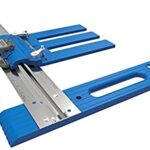
Due to their large scale, if you are cutting a lot of sleepers in one go, then using a hand saw is not the best option as you will tire quickly and there is a high risk of injury and inaccuracy. The best type of mitre saw for cutting sleepers is a sliding mitre saw. Best Circular Saw – Bosch Professional Hand Held Circular Saw 240 V, Saw Blade 190 mm, 1400 W. We talked earlier about the importance of having a large cutting depth when using a circular saw for cutting sleepers and that’s exactly what you get with this product.
Cut your sleepers with a circular saw or a chainsaw by slowly making clean, straight cuts. A circular saw is the most widely used method for cutting sleepers at home. A high-end table saw with a 12 inch blade can cut a 4×4 in one pass with maximum cut of about 4 inches.
I’m concerned with the number of people recommending a chainsaw, circular saw or chop saw. The nature of a blade thats spinning upwards means that when a kickback occurs, the saw is going to come back towards you and turn so the blade is facing you(legs,arm,stomach). Yes thats a way of doing it, but oak is a hard timber, and the saw blade, especially at full depth will have difficulty.
In. How To Outdoors Sleepers 7 Mins Read. Sleepers are getting more and more common, particularly softwood sleepers for raised beds or steps in the garden. A circular saw will not cut all the way through so you will have to flip the sleeper onto each side, even then you will still probably have to finish it off with a handsaw. Below is the saw I use myself and indeed the saw I used when cutting this sleeper.
Sleepers are best constructed on a firm and level surface such as soil, grass, decking or concrete you should still use a spirit level to ensure the surface is as level as possible. Depending on your project, you may wish to use sand, cement or offcuts to level things out. For retaining walls and steps, it’s also worth using a string line to check your levelling.
best circular saw for cutting sleepers Related Question:
What is the best saw for cutting sleepers?
A circular saw is the most widely used method for cutting sleepers at home. The most accurate method for cutting larger sleeper quantities, you will find in most instances that the blade is not deep enough to cut through the depth in one pass. Instead, the sleeper will need to be rotated and cut in sections.
How can you cut sleepers?
Cut your sleepers with a circular saw or a chainsaw by slowly making clean, straight cuts. Use a square angle ruler to make sure your sleepers will fit perfectly. Alternatively you can ask for sleepers to be precut which The Luxury Wood Company is happy to do.
Can you use a chop saw to cut sleepers?
If it’s softwood then a good hand saw will do it. Or circular saw both sides and finish with hand saw.
How do I join sleepers on top of each other?
If you are stacking the sleepers horizontally on their broadest side, e.g. on the 250mm width of a 250mm x 125mm sleeper, then all you need to do is to overlap the joints of the sleepers, from layer to layer, like building a brick wall, and fasten each layer to the layer below with timber lock screws or similar.
How do you anchor sleepers to the ground?
Cut your sleepers to your required length, which could be random for a rustic look. Then mix up some lean mortar, such as 6:1, to be used as a concrete base and haunching. Place at least a 50mm bed of concrete in the bottom of the trench and start inserting the sleepers, haunching them up as you go.
What is a scorpion saw?
The versatile Scorpion® Saw combines a reciprocating saw, pruner and jigsaw in one. With Autoselect® technology, it automatically adjusts the settings at the push of a button, delivering hassle-free versatility and powerful cutting through timber, metals and plastics.
Can you lay sleepers on soil?
Can you lay railway sleepers on soil? Yes you can. If you’re only creating a structure that’s one or two sleepers in height you don’t necessarily need foundations, which means you can lay your railway sleepers onto the soil.
How do you fix railway sleepers to the ground?
Haunch at the back end of the sleeper and if possible, the front end too. This will help fix sleepers to the ground so they remain stable. If using sleepers for a low border or planter it may well be enough to fix a wooden post or spike behind the sleepers and fix this into the ground.
How do you prevent sleepers from rotting?
To preserve the sleepers further, we would recommend treating them with an exterior wood oil or decking oil, ideally twice a year in Spring and Autumn. This will help to repel water and prevent water ingress, the main cause of wood rot.
What is an alligator saw used for?
An alligator saw works with the use of a two durable saw blades that move in opposite directions, giving you accurate straight cuts and great control when cutting through construction materials such as timber, aerated concrete, hollow clay blocks and insulation.
Can a circular saw cut 100mm?
The MAKITA HS0600 240v Circular saw – 270mm blade has the following features: 2000 Watt. No load speed: 4300rpm. Depth of cut: 100mm.
What should I Bed railway sleepers on?
The railway sleepers should ideally be laid on a surface that is level and firm. Many people simply lay them down directly on the earth, grass, deck or concrete.
How do you bolt sleepers together?
With sleepers on a narrow edge, simply screw the sleepers together at the 90 degree corners, allowing at least 50mm (or 2″) of the screw to penetrate the adjoining sleeper. Two screws per corner is ideal.
Can you lay sleepers on sharp sand?
If you wish to add finishes or other treatments to your sleepers, this is the best time to do so. Laying sharp sand into your channels or in the dug area of your pathway will ensure each board has a nice even foundation. Pour in a layer of around 25mm and pack it down using one of your sleepers or a tamper.
How long will sleepers last in the ground?
How long do railway sleepers last? Railway sleepers will last for years, with our softwood treated sleepers typically lasting around 8 to 10 years due to the pressurised treatment, and UC4 treatments extending this to 15 years.

